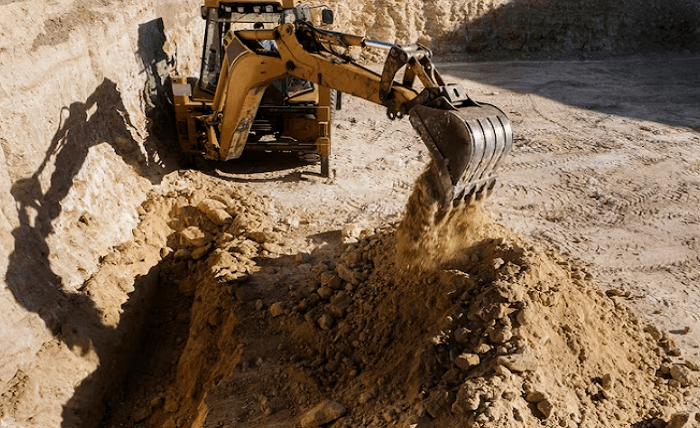Understanding Why Digging Foundations Is Not a DIY Job!
Building a structure or adding an extension starts with digging foundations. This forms the most crucial part of construction since an unstable foundation can quickly lead to the demise of your building, home, or addition, resulting in water leaks and cracks.
Digging foundations goes beyond merely pouring concrete and laying footings; it’s a complex process that requires different approaches for basements and crawlspaces. Sometimes, foundations need to be thicker to resist moisture or support the weight of a heavy building. Regardless of the scale of the excavation, it’s a risky task not recommended for untrained hands. For these reasons, it’s advisable to hire an excavation professional.
Let’s delve into the importance of a foundation, what makes a good foundation, common mistakes to avoid when digging, and why foundation excavation can be so dangerous.
The Multifaceted Role of a Foundation
Foundations serve more than just the purpose of supporting a structure. Without a solid foundation, buildings, homes, and even large sheds can collapse or sink. Here are a few roles that foundations play:
- Moisture Barrier: Foundations prevent moisture from entering the structure. A solid concrete foundation is required to protect the wooden frame of a house from water absorption, which can lead to softening, cracking, or splitting.
- Cold Shield: Foundations protect the building from ground cold. Without a foundation, materials like wood and paper can absorb cold from the ground, which is a problem even in summer.
- Resistance against Ground Movement: The earth can shift due to running water, vehicle traffic, and other disturbances. A stable and solid foundation shields a building from these movements, preventing cracks, chips, or splits in the walls, ceilings, and floors.
What Constitutes a Good Foundation?
Like a suit tailored to fit its wearer, foundations must align with the structure they support. Factors like soil and water table conditions of the area significantly influence the construction of a foundation. Dry or moist soil might require the concrete’s thickness and strength to be increased, while heavy structures might need stronger foundations.
Common Reasons for Foundation Failure
Although a foundation should last for decades or even forever, certain mistakes can lead to cracks and chips. Some common causes of foundation failure include:
- Moisture-Retaining Backfill: Materials like clay can retain excessive moisture, which the concrete foundations can absorb. This absorption can cause pressure, leading to cracks and leaks.
- Rushed Curing Process: Contractors sometimes hasten the curing process, which can weaken the foundation. The foundation should be allowed to cure for several days before starting construction to achieve maximum strength.
- Poor Base Compaction: The foundation base must be properly compacted. If not, the concrete can settle into the crevices of the crushed stone base, causing issues.
- Pouring Foundation in Parts: Pouring the foundation at different times can create seams, through which moisture can seep, leading to cracks and settlement.
Why DIY Foundation Excavation is Risky
Despite the temptation to dig your own trenches for the foundation of a building, it’s fraught with potential pitfalls:
- Permits and Regulations: Local building codes dictate excavation standards. Overlooking minor codes can lead to significant expenses down the line.
- Tree Roots: It’s essential to remove all tree roots before pouring the foundation, as they can wrap around the foundation, causing damage.
- Equipment Logistics: Ensure you can get the necessary equipment to your site before renting, considering factors like the width and weight of the equipment and the accessibility of the site.
- Removal Plan: Piling dirt next to the trench can cause a wall collapse or landslide. Consider engaging companies that remove clean fill dirt for free.
Why Excavation Can Be Dangerous
Excavation is inherently risky, even if you’re familiar with the equipment and the process:
- Risk of Wall Collapse: If a trench wall collapses, a worker can become trapped and suffocate.
- Dust and Sand: Excavation produces copious amounts of dust and sand, which can cause lung irritations, eye problems, and sinus issues.
- Overhead Power Lines: Many people know to mark underground power lines, but overhead lines can also pose a risk.
- Pit Wall Fragility: The walls of an excavation pit can be fragile and may collapse if equipment or people get too close, causing serious injuries.
Given these reasons, it’s wise to hire professionals for foundation excavation. They have the required expertise, the right equipment, they are insured, and they ensure all permits are in place before the work begins. By doing so, you ensure your new foundation is built safely and efficiently.
This post was written by Tanner Brown. Tanner is the Owner and operator of Greenbar Excavation. Greenbar Excavation is a fully licensed, insured, and accredited excavation and Septic Service in Prineville, Oregon. Greenbar Excavation is one of the top Don’t look further, go with the company with your best interest in mind!

